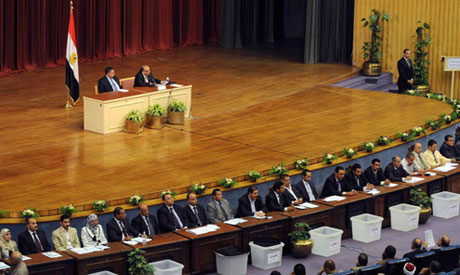
File photo: A general view of the two chambers of parliament meeting to elect the 100 members of the constituent assembly in Cairo (Photo: Reuters)
Administrative courts on Tuesday are looking into three separate appeals whose rulings should have a large impact on the political and social transition process Egypt is undergoing.
The courts will judge on the legitimacy of the lower and the upper houses of parliament, the Constituent Assembly and the Addendum to the Constitutional Declaration.
Many see these court challenges as a struggle between, on the one side, Morsi and the party who brought him to power, the Muslim Brotherhood's Freedom and Justice Party, and the judiciary, on the other.
These court challenges are also seen as a battle between the Supreme Council of Armed Forces (SCAF) and the newly-elected President Mohamed Morsi for domination over parliament.
The latest chapter in this ongoing battle unfolded earlier in the month. On 8 July, Morsi issued a presidential decree that reinstated the Islamist-led-parliament, which was dissolved on 14 June by the military council which claimed that it was implementing a High Constitutional Court (HCC) order that rendered some articles in the parliamentary elections law unconstitutional. Two days later, the HCC indirectly scolded the president's decree by atypically holding an impromptu session and issuing a statement asserting that all of its legal opinions on constitutional matters are final and must be respected.
The Administrative Court is expected to examine appeals filed against last month’s addendum to the Constitutional Declaration. The appeals, filed by a number of lawyers, call for the suspension of the addendum, which the SCAF issued on the last day of the presidential election runoff (17 June) to limit, among other things, the powers of the president.
One of the administrative courts will also examine the constitutionality of the Shura Council (parliament upper house). The legal challenge to the Shura Council elections is based on the fact that members of political parties were allowed to compete with independent candidates for the individual candidacy seats, violating the principle of equal opportunity. This is basis on which the HCC found the lower house of parliament unconstitutional in June.
Based on the argument above, the HCC ruled on 14 June that the elections law that voted-in members of parliament to the People’s Assembly (lower house) was unconstitutional. The assembly was consequently dissolved by the SCAF.
Moreover, the administrative courts will also examine the constitutionality of the parliament-appointed Constituent Assembly tasked with writing a permanent constitution. This is the second Constituent Assembly designed this year. The first one was found unconstitutional.
Short link: